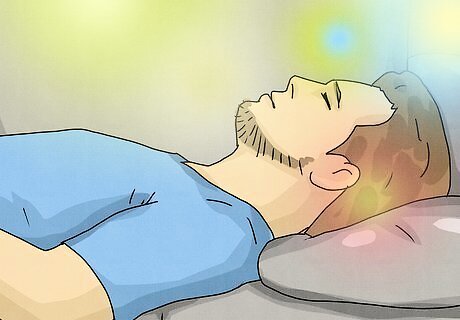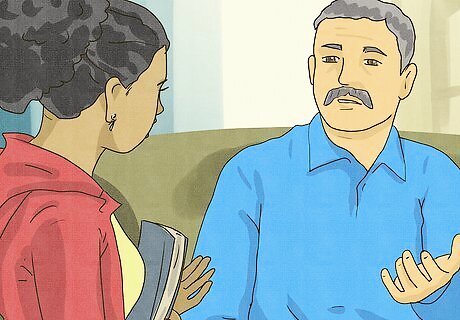
views
X
Trustworthy Source
Science Direct
Online archive of peer-reviewed research on scientific, technical and medical topics
Go to source
Ready to get started? Let’s dive into your past and see what you uncover.
- Meditate and ask your guides to open your Akashic Records, which hold info about your past lives. Ask open-ended questions and see what feels true to you.
- Alternatively, visit a hypnotist or hypnotize yourself to visualize your past lives.
- Examine your memories, dreams, fears, and problems to discover clues about your past lives.
- Verify your memories by recording your dreams and learning about the people and places you remember.
Reading Your Akashic Records

Meditate in a quiet room. Get comfortable and close your eyes, then concentrate on your breath. To clear your mind, count your breaths or repeat a mantra. Try a mantra like, “Open,” or “Peace.” When you’re first getting started, try guided past-life meditations from Insight Timer, Headspace, or Calm.

Call on your guides for help. Your spirit guides provide you with direction and advice throughout your life. When you’re accessing your Akashic Records, your guides can help you get the information you need. Plus, they’ll help you recognize which memories are real, and which could be fantasy. “Spirit guides, I need you now. Please guide me through my Akashic Records.” “I call out to my spirit guides, asking for help. Please show me what I need to know from my Akashic Records.”

Request permission to enter your Akashic Records. Your Akashic Records include everything that you’ll ever think, do, or experience—in your current life and in your past lives. You can open them yourself, but you’ll need permission from your guides. After you ask, let your guides lead you into the room. “Can I read my Akashic Records?” “I want to access my Akashic Records.”

Visualize yourself in a room full of books or files. Your records might look like a library or bookstore, or you might envision a bunch of file cabinets. Let your imagination flow as you picture your Akashic Records. Glance around the room to see what’s there. Everyone experiences this differently, so there’s no right or wrong way to do it. Just trust in yourself.

Ask an open-ended question about your past life. Since your Akashic Records have so much info about you, focus on what specific thing you want to know. That way, you’ll get clearer answers. Just make sure you don’t ask leading questions because they can create false memories. Here are some good questions to ask: “What did I do in my past life?” “What lessons am I learning in this life?” “What lessons did I learn in my past life?” “Where did I live in my past life?” “Who do I know from a past life?”

Let go of your ego so you can find the truth. While past life memories are sometimes verified by research, your imagination may create false memories when you delve into your past lives. Try to remain totally open to whatever information comes to you. With practice, you’ll be able to sense what feels true and what feels like your ego talking. Notice how you feel when you think about the truth versus known lies. For instance, true memories might feel light and airy to you, while false memories might feel heavy.

Close your Akashic Records when you’re finished. Leave your Akashic Records once you have the answers you seek or when you start to feel tired. To end the session, picture yourself leaving the room of books or files, sealing it on your way out. Then, slowly open your eyes. It’s no biggie if you forget to visualize yourself leaving. Your spirit guides can close them for you after you leave.

Write down what you experienced. Keep a record of everything you remember so you can verify what you experienced. Add to your notes every time you read your Akashic Records. In time, you could have a really amazing timeline of your past life. Jot down your experience when the memory is fresh in your mind. You may remember things from multiple past lives, so be open to a variety of experiences.
Undergoing Past Life Regression

Visit a hypnotherapist who specializes in past life regression. A hypnotherapist can help you easily examine your past lives. To find a therapist, look for hypnotherapists in your area, then check their websites to see if they offer past life regression. When choosing the right therapist, ask your hypnotherapist about their education and experience doing past life regression. Read each therapist's reviews to see how other clients liked working with them. Some researchers argue that past life regression therapy leads to false memories. Additionally, it may cause trauma if you remember painful experiences.

Do self-hypnosis if you want to try this on your own. You can achieve self-hypnosis by going into deep meditation. To fully relax yourself, breathe deeply and do progressive muscle relaxation. Open your mind so you can experience your past life memories. It may take some practice to fully relax your mind. Keep trying if it doesn’t work right away.

State your intention so you get helpful information. Your past life experiences can feel overwhelming if they all flow back at once. It might be hard to understand what happened. Make sure you have a specific intention so that you get clear information. You intention could be to: Explain a current fear, problem, or recurring dream Make progress in your career or relationships Remove barriers Get out of a rut

Visualize your past lives. Let your thoughts flow until an image starts to form. Allow yourself to see and hear your past life experiences. Really pay attention to your surroundings and the people you see. Additionally, look for clues to where you are and what you’re doing. It’s okay to ask open-ended questions like, “What’s happening?” “Where am I?” or “What am I remembering?” to get more information. If you’re working with a hypnotherapist, they’ll ask you questions to lead you through your past life. Try your best not to drive the vision or to ask leading questions, like “Am I a doctor?” or “Is this my spouse?” You don’t want to accidentally create a false memory.

Record the memories you recovered. When you’re ready, open your eyes and write down everything that you saw. You can use these notes to verify your memories and do further research. Keep your notes so you can refer back to them after future past life regressions. If you’re working with a hypnotherapist, you might ask them to record your sessions so you can listen and write down what you said.
Recognizing Past Life Memories

Keep a dream journal to watch for patterns. You might actually experience past life memories while you’re dreaming. Writing down your dreams can help you recognize recurring themes or dreams that feel more “real” to you. After you wake up, immediately jot down everything you remember so you can interpret it.

Pay attention to dejá vu. Dejá vu is the feeling that you’ve done something or been somewhere before. In most cases, deja vu happens because you’re remembering something in your past, even if that memory is buried really deep. Some people believe that dejá vu occurs because you’re having memories from your past life. When you have dejá vu, document it so you can see how it relates to your other past life memories. Maybe you're on vacation and feel like you've been to the city before. Perhaps you've met a new person but they seem really familiar to you.

Explore memories that don’t fit your present life. Sometimes, memories of your past life pop up without you realizing it. You may find that you remember an event or person that no one else does. When this happens, write down everything you remember so you can examine the memory further. You might be remembering a previous lifetime. You could remember a birthday party that didn’t happen in this lifetime, or working at a different job. Keep a journal of your past life memories so you can piece them together.

Trace your fears back to your past life. Your fears in this life might stem from negative experiences in your previous life. To figure out what happened in your past life, identify your greatest fears and phobias in the present. Then, see if they can help you remember what happened in your prior lifetime. Maybe you’re afraid of water because you drowned in your past life. Perhaps driving scares you because you were in a car accident.

Examine your passions or interest in other cultures. Some people who remember their past life have a deep interest in where they used to live or what they used to do. Sometimes you might even feel like you're meant to do something or you belong somewhere else. Explore your greatest passions to see if they might give hints about your previous lifetimes. A concert pianist might play music by ear. A former ship captain might love the sea. You might really love Indian culture if you used to live there in a prior life.

Identify issues, habits, or pains that don’t seem to have a source. Your past lives can have a big impact on your current life. It’s possible for experiences you had in a past life to cause a problem or obstacle right now. Things like personal struggles or unexplained pain could stem from a problem you had in your past life. Write down these issues so you can explore them further. Perhaps you struggle in relationships if you had a bad heartbreak in a prior lifetime. Maybe your leg hurts because you injured it in your previous life. It’s possible you hoard food because you were starving in a past life.
Verifying Past Life Memories

Look for birthmarks that relate to your past memories. Some people believe that birthmarks can reflect injuries you got in a past life. While there’s no scientific proof this is true, you might see how your birthmarks connect to the memories you have of your past life. For instance, you might have a birthmark on your knee from a fall in your prior lifetime.

Research the information you remember. You’ll feel more confident in your past life memories if you find proof to back them up. To look for evidence, check your memories against historical records and genealogical sites. Whenever possible, read books about the time period you experienced or the historical figures in your memories. Additionally, watch documentaries about the events or places you remember. Try to verify names, dates, and locations if you can. If your memory is vague, reading about the time period, location, or profession could help.

Talk to people who know about the people and places you remember. If your prior lifetime was recent, you may be able to find people who knew you. Similarly, you might be able to connect with people who’re from the area where you lived. If they’ll talk to you, discuss what you remember so they can tell you if you’re remembering correctly. Historians and teachers may be able to help if you remember a past life that occurred a long time ago.

Visit the places you went in your past life memories. Going to the locations you saw will help you verify what you experienced. Compare what you remembered to what you see in real life. Hopefully, visiting the place will also help bring back more memories. While you’re there, consult historical documents to see if you can back up your memories.
Handling a Child’s Past Life Memories

Listen to what your child has to say. Be open to what your child remembers, without drawing conclusions. Let them direct the conversation and just soak up what they remember. If you like, write down what your kiddo remembers so you can check into it later. Kids who remember past lives typically say they experienced something traumatic, like an accident. That’s totally normal, so try not to worry if your child has scary memories.

Ask open-ended questions if you want to know more. It’s natural to have questions when your child starts talking about a past life. At the same time, they might feel obligated to make something up if you ask them a leading question. Instead, stick to open-ended questions that your child can answer in whatever way feels right. “What else happened?” “How do you feel about that?” “What do you remember about that?”

Empathize with your child if they get upset. Sometimes, kids remember unpleasant events from the past. It’s hard seeing your kiddo get upset over a bad memory, but you can be there for them now. Offer comfort and kind words so they know they’re safe with you. “That sounds so scary.” “I’m sorry that happened.” “You’re safe now.”

Encourage your child to focus on the here and now. While past lives are interesting, it’s important to live this life. Remind your child that the past is in the past. Then, invite them to play with you so they can have fun in the moment. “It’s so interesting that you used to fly a helicopter. But let's talk about what you like now. Do you want to play blocks with me?” “I know you remember a different house, but this is where we live now. It’s where your room and your toys are. Why don’t we go play dolls?”

Expect the memories to fade around the time your child turns 6 or 7. Most kids who remember their past lives start talking about their memories at around age 3. Over time, these memories will fade, so your kiddo probably won’t remember anymore after they get a little older. Let your child move on from their past life memories when they’re ready.




















Comments
0 comment